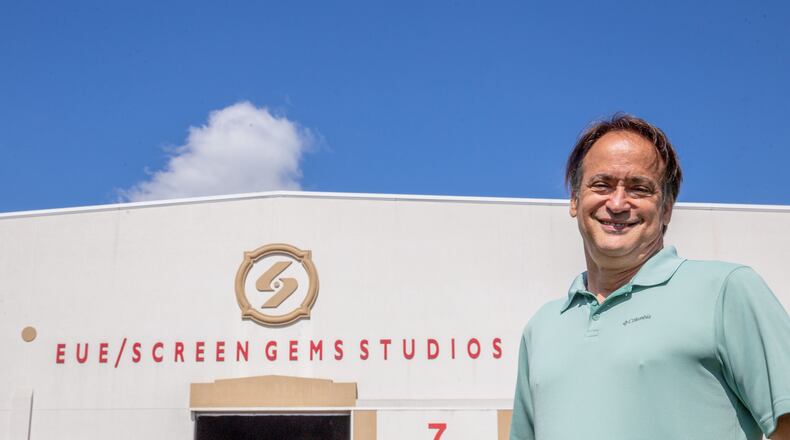The Lakewood Fairgrounds in South Atlanta has a storied past going back more than a century. Over the years, it has hosted countless farmers showing off their prize pigs, hordes of teenagers screaming down a 66-foot roller coaster drop and crowds of antique shoppers angling for bargains.
And over the past decade, on the same property, Denzel Washington’s Whip crash-landed an airplane, Jennifer Lawrence’s Katniss Everdeen fended off foes with her signature bow and arrow and Millie Bobby Brown’s Eleven took down a scary demogorgon. None of this would have happened in Georgia without the risk-takers at EUE Screen Gems, which also owns sound stages in New York, Miami and Wilmington, North Carolina.
Two years after the state passed generous tax credits to entice the likes of Disney and Sony to invest hundreds of millions of dollars into the state of Georgia, EUE/Screen Gems gambled its own millions of dollars to renovate and open its own studio on 30 acres of Lakewood land in 2010. Kris Bagwell, the studio’s first executive director who is departing later this month, promised hundreds of jobs with a goal to establish Georgia as a truly hospitable home for TV series and big-budget films.
While dreamers have attempted many projects that never quite panned out at Lakewood in the past, this particular effort worked out even better than the owners expected. EUE Screen Gems’ success helped open the door for other entrepreneurs to enter the field, including Eagle Rock Studios in Norcross and Stone Mountain, Atlanta Metro Studios in Union City and Pinewood Studios in Fayetteville (now Trilith).
“Screen Gems showed us how to do space as it ought to be done,” said Ric Reitz, an actor who helped design the tax credits in 2008. “Everybody loved it. They had the background and the connections to make it happen and gave us a template for what would follow.”
Georgia today has 100-plus soundstages, more than any state except California. Thanks to an insatiable demand for TV and film content coming out of the pandemic, business is booming.
EUE/Screen Gems, now with 10 soundstages and plans to build more, is currently working with Netflix to shoot the second season of “Raising Dion” and the fourth season of “Stranger Things,” which alone employs around 500 people.
Credit: PUBLICITY PHOTOS
Credit: PUBLICITY PHOTOS
Lakewood opened in 1916 as an agricultural fair with supporters raising money to erect Spanish Mission-style exhibition halls. They also built a dirt race track, an amphitheater, a Carnival Midway and a big roller coaster dubbed the Greyhound.
By the 1970s, the fair had lost its appeal and shut down. Burt Reynolds, for his film “Smokey and the Bandit II,” famously blew up the Greyhound. Former Georgia film commissioner Ed Spivia’s Filmworks USA in the early 1980s signed a longterm lease in hopes of turning Lakewood into a first-rate movie studio.
That never came to pass, so Spivia pivoted, turning it into a popular antique market until 2006. For four years, the buildings largely lay empty, becoming a magnet for vandals, gangs and homeless people.
Enter the Cooneys, who for decades ran studios that were home to the soap opera “Guiding Light,” the WB show “Dawson’s Creek” and Marvel film “Iron Man 3.” After Georgia amped up its tax credits in 2008, executives spent 10 months searching for space in metro Atlanta.
They used real estate broker John Raulet in part because he had brokered Tyler Perry’s first studio space off Krog Street. He said he showed them about 20 locations. Despite its dilapidated state, Lakewood stood out. The Cooneys like its close proximity to both downtown Atlanta and Hartsfield-Jackson International Airport.
It also didn’t hurt that the buildings evoked the classic soundstages of Los Angeles. “There is nothing else like it in Atlanta,” Reitz noted.
EUE/Screen Gems in 2010 signed a 50-year lease with the City of Atlanta. Cooney noted that his company receives zero tax credit money. They are simply a vessel to make it easier for makers of TV and film to get the 30% tax credit.
Chris Cooney, CEO of EUE/Screen Gems, hired the affable Atlanta native Bagwell ― a former MTV Networks executive who actually helped get MTV signed onto a cable network in Atlanta in 1986 ― to run the operation. Bagwell had no experience running a studio but possessed a deep background in business development and client relations, Cooney said.
Bagwell’s goal was to help early shows like BET’s “The Game” and USA’s “Necessary Roughness” (when basic cable was ascendant) to stay on schedule and on budget. That meant being on call 24/7, fixing broken lighting or a wonky door at a moment’s notice.
“It can get wacky,” said Bagwell. “You don’t realize how expensive it is for these production companies if they have delays. If a single door breaks and they can’t shoot for an hour, that could be tens of thousands of dollars lost. Our job is to be rapid service problem solvers.”
At the time EUE/Screen Gems opened, there were only a handful of small rental spaces available. Tyler Perry was using his Greenbriar studio just for himself and was already outgrowing it. Raleigh Studios in Senoia was taken up by AMC’s “The Walking Dead.” Lifetime’s “Drop Dead Diva” was using a converted airplane hangar in Peachtree City. EUE/Screen Gems was effectively a turnkey operation with the proper specs and acoustics producers came to expect in Los Angeles or Vancouver.
Credit: Jenni Girtman
Credit: Jenni Girtman
As a result, they nabbed some films such as Perry’s “For Colored Girls,” Vince Vaughn’s “The Watch” and Washington’s “Flight.”
In 2013, EUE/Screen Gems was able to entice Lionsgate to set up shop to shoot the final two films of the massively popular “Hunger Games” series, taking over the entire campus.
“A lot of studios out West took notice of us after ‘Hunger Games,’” said Raulet,
Credit: bsanderlin@ajc.com
Credit: bsanderlin@ajc.com
who learned to run his own Mailing Avenue Stageworks studio from executives at EUE Screen Gems. “That legacy is huge. They put us on the map.”
EUE/Screen Gems was also prescient when streaming giant Netflix approached them in 2016 to shoot an untested sci-fi show called “Stranger Things,” which became one of the streaming service’s biggest hits in its short history.
“It’s been a wonderful relationship,” Cooney said. “We try to bring them as much value as we can.”
Bagwell is leaving soon to run a studio in Queens, New York, and Cooney is sad to see him go. “He’s an amazing manager of complex facilities with a sense of urgency wrapped in a nice guy.” Bagwell also knew how important the tax credits are to EUE/ Screen Gems’ survival. He created a studio alliance and regularly hosted state legislators to tour the facilities to ensure they understood the value of the jobs they were creating, such as caterers, electricians and carpenters.
But Bagwell is confident in his replacement; longtime Atlantan Billy Stoll, a low-key man who worked at CBS46 as a production tech in the 2000s and built up a knowledge base the past few years working under Bagwell.
“Billy won’t miss a beat,” Bagwell said. “He has a black belt in operations.”
Credit: BET
Credit: BET
About the Author
Keep Reading
The Latest
Featured






